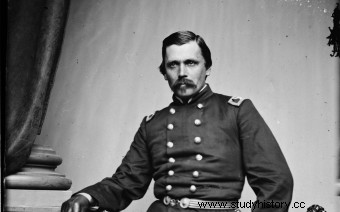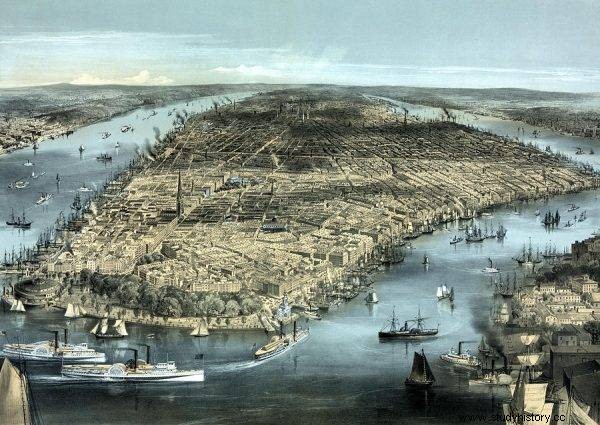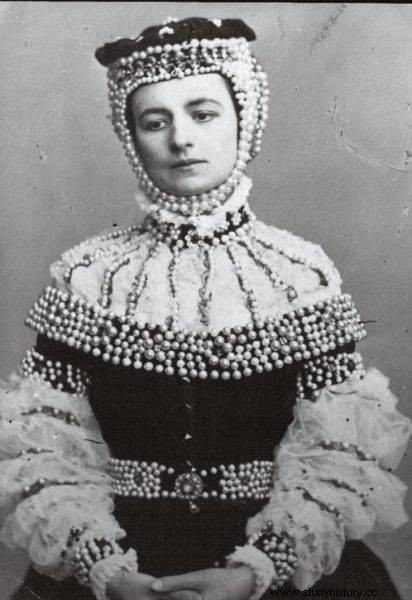Bartenders often have good stories to tell. In 1874, the owner of a tavern in San Francisco claimed that the US Senate had not approved his appointment as Brigadier General because no one could pronounce his name. His name was Włodzimierz Krzyżanowski.
The story is most likely true, which is not the case with this gentleman at all. Stories that he was the closest cousin of Fryderyk Chopin or the governor of Alaska are not confirmed, although you can read about them even in the Polish biographical dictionary . However, Krzyżanowski had some adventures anyway.
"What will mum say to that?"
He was born in 1824 in Rożnów near Oborniki in Greater Poland. His childhood was not very happy. My father ran into terrible debts, sold his property, and died shortly thereafter. The mother took the other children and left for Kongresówka, and little Włodzimierz was brought up by his father's relatives in Poznań.

Włodzimierz Krzyżanowski was 24 years old and did not know a word of English. After disembarking, he didn't know what to do with himself. Later he claimed, quite enigmatically, that he used the words "spoken involuntarily in the old speech of the Lechites".
His youthful lust for adventure and patriotic traditions (his uncle and stepbrother fought in the November Uprising) led him to conspiracy. Threatened with arrest in 1846, he left for Hamburg, where he bought a ticket for a ship to America. The day before his departure, he went, as he put it, "get acquainted with the gambling game." And in a matter of hours, he let all the funds go.
He was lucky, because in Hamburg, probably in a puff of cigarette smoke, heard in his native language:"What will mum say to that?" . It turned out that he met a gentleman from Greater Poland who really knew his mother. He lent Włodzimierz money, ensuring that he would get it back from Mrs. Krzyżanowska. The boy immediately ran to the ship to - as it turned out - leave Europe forever.
The words "in the old speech of the Lechites"
He saw America a few weeks later.
New York, the capital and largest city of the huge United States, still looks bad from the sea today - and it was much worse then. The panorama in front of The ship calling at the port was by no means picturesque. A flood of roofs, mostly flat, a large sheaf of scattered factory chimneys and walls, walls on all sides, pressing against each other - he recalled over three decades later.
It was not a one-time mistake with the capital city of New York, because in his memories he often calls the city the capital. He felt that the heart of America beats there.
Włodzimierz Krzyżanowski was 24 years old and did not know a word of English. After disembarking, he didn't know what to do with himself. Later he claimed, quite enigmatically, that was saying the words "uttered involuntarily in the old speech of the Lechites". He was probably just cursing juicy that he was persuaded to go to the United States. But immediately a coachman noticed him, as it turned out a Pole who had lived on the other side of the Atlantic for many years. He threw himself at Krzyżanowski, he greeted him with almost tears in his eyes and took him to his friends, also Poles.

Picture showing New York around 1850
The solidarity of Poles in exile sounds a bit exotic, but the emigration of the first half of the 19th century was different from that of the later. The times have not yet come when poverty drove the peasants from the Vistula and sent them across the Atlantic. There were many emigrants of noble origin - and the Polish nobility felt state-national solidarity.
"Negro War of Independence"
Krzyżanowski's life in the United States began to unfold. He learned the language, got a job as a civil engineer with surveying in Virginia, then building railroads in the Midwestern states. In 1854, he married Caroline Burnett. Her father is said to be a general, but census data indicate that she was the daughter of Enoch Burnett, who worked in the pottery business.
In any case, Krzyżanowski took root, became politically active and had strong views on the issue of slavery . When the Civil War broke out and on April 15, 1861, President Abraham Lincoln called for 75,000 volunteers, Krzyżanowski was at the head of the militia unit a week later. The unit was officially called "Krzyzanowski's Company, Militia Infantry". This is how he began his participation in, as he called it, the "war for independence of the Negroes." He considered it one of the "noblest deeds of this century."
Polish Legion
The unit formed by Krzyżanowski was disbanded a few months later, but he himself remained in the army. In August 1861, he was promoted to colonel and eventually became the head of the 58th New York Infantry Regiment. Although the core of the unit was made up of Germans, Italians, Danes, French and Russians, it was called the Polish Legion.
Krzyżanowski was a living exemplification of the phrase "for our freedom and yours" . He was not a particularly gifted commander, but he was certainly brave and selfless. He suffered a concussion in the Battle of Bull Run and was crushed by a horse that was killed underneath him at Gettysburg. He was appreciated because on November 29, 1862, he was appointed brigadier general. Carl Schurz, a German journalist and friend of Krzyżanowski, wrote:
The president appointed him [...] to this rank, but the Senate refused to approve the nomination because, as it was said, there was no one there to pronounce him surname.
Piotr Derengowski, the author of the book on the participation of Poles in the Civil War, stated:
Although the situation described by Schurz seems unlikely, it may contain a grain of truth, especially since in the documents of the Senate Krzyżanowski's name appears as "Kerzyzanowski".
In March 1863 the time for the ratification of the nomination expired. It wasn't until two years later that he received another nomination for brigadier general, approved by the US Senate in March 1865.
Bartender, not governor
On October 1, 1865, Krzyżanowski returned to civilian life. In the reports sent to the old country, he claimed… What did he not make up! He was to be cared for by Alabama. Then " the government [...] made me Governor of the three richest southern states:Florida, Georgia and Virginia ". Little? It also added an important function in Alaska, just bought from the Russians. As a result, even in scientific publications, he is listed as the governor of this state.
In fact, he worked for several years in the broadly understood administration - first as the head of the post office in the Georgia and Florida District, then he was an agent of the Treasury Department in New Orleans, and finally in Washington. In 1874 he was released and moved to California.

He opened a pub in San Francisco. By the way, he met Henryk Sienkiewicz and Helena Modrzejewska, whom he helped at the beginning of his American career.
He opened a pub in San Francisco. By the way, he met Henryk Sienkiewicz and Helena Modrzejewska, whom he helped at the beginning of his American career. After a while, the recession wiped out his business, and the Civil War veteran went looking for a new place to live.
The aging Krzyżanowski was a customs agent in Panama, then he moved to New York. In 1882, he was widowed and began to suffer from asthma. He wrote down memories, he missed his homeland . He assured that "for me the most modest house would be nicer [...] the most magnificent palaces here" . He had plans to return to Europe, but on January 31, 1887, his death took him on the last path.
In the nineteenth century, you can find several more interesting biographies of Poles looking for happiness in distant countries, but Krzyżanowski's fate is reminiscent of what slavery in the United States was from the perspective of Poles at that time. And it was a practice that most condemned, and some - like Krzyżanowski - did not regret blood to put an end to it.
Studies
- Chlipała Michał, Contribution to the history of the 58th New York Volunteer Regiment - Polish Legion , "Scientific Journals of the Jagiellonian University. Historical Studies ”138, 2011.
- Derengowski Piotr, Poles in the Civil War of 1861-1865 , Oświęcim 2015.
- Grot Zdzisław, General Włodzimierz Krzyżanowski , "Chronicle of the City of Poznań" 15, 1937, 1.
- Grot Zdzisław, Krzyżanowski Włodzimierz , [in:] Polish biographical dictionary , vol. 15, 1970.
